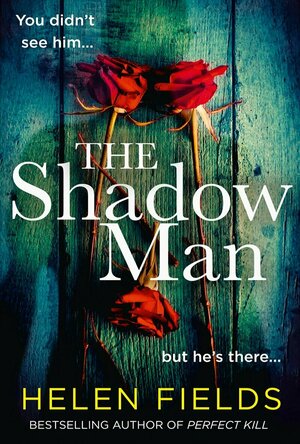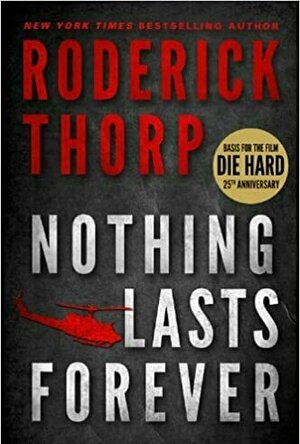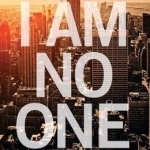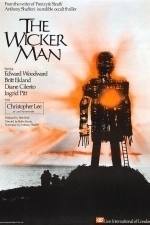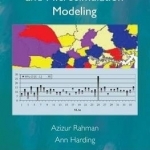
Small Area Estimation and Microsimulation Modeling
Book
Small Area Estimation and Microsimulation Modeling is the first practical handbook that...
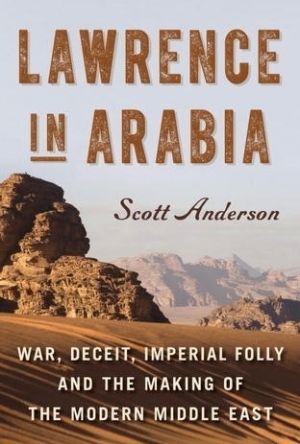
Lawrence in Arabia: War, Deceit, Imperial Folly, and the Making of the Modern Middle East
Book
A thrilling and revelatory narrative of one of the most epic and consequential periods in 20th...
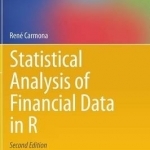
Statistical Analysis of Financial Data in R
Book
Although there are many books on mathematical finance, few deal with the statistical aspects of...
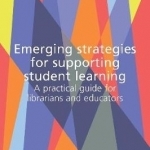
Emerging Strategies for Supporting Student Learning: A Practical Guide for Librarians and Educators
Book
Emerging Strategies for Supporting Student Learning provides a straightforward and accessible guide...

Public Urban Space, Gender and Segregation: Women-Only Urban Parks in Iran
Book
Public spaces are the renditions of the power symmetry within the social setting it resides in, and...
Ross (3284 KP) rated The Shadow Man in Books
Feb 19, 2021 (Updated Feb 19, 2021)
Connie is a fairly stereotypical academic, clinical type as she has virtually no people skills on the surface, issuing demands and attacking conversations head-on in a very un-British way. And yet when we see her interviewing witnesses, such as a young girl who saw a schoolmate be abducted, she is suddenly very tactful and sensitive. In this way, she is both an interesting, complex character, but also a much seen cliched one. She has a tendency to do an awful lot of telling during interviews, explaining to all in the room the theory of her approach to the interview. While this was interesting, it took me right out of the book as something completely unnatural, and read more as a brain dump of the author's research for the book. A little more show, less tell as usual would have worked well here.
Baarda is similarly familiar, a dedicated career cop with marital problems (his wife having an open affair with another officer).
Together, the pair piece together few clues and start to evolve something of a profile for the man who has been kidnapping people. However, I felt this aspect didn't yield results until quite late on, all progress up to that point (next to none) was through standard police work/luck.
The antagonist here was interesting, but nowhere near as dark and mysterious as the blurb makes him sound. We're not talking Hannibal Lecter here, just a confused man with a fairly typical upbringing. Fields essentially cottoned on to an interesting medical/psychological condition and pieced together a plot based on it. While this was enjoyable, it made it somewhat crime-by-numbers.
A good book, but left me longing for Ava Turner's more likable policing style.
Advance reading copy received from the publishers and netgalley in exchange for an honest review.
Benedick Lewis (3001 KP) rated Nothing Lasts Forever (Die Hard, #1) in Books
Sep 30, 2020
However, having seen Die Hard multiple times, it was sometimes difficult to picture the protagonist, Joe Leland, doing the John McClane things. Further more, the book only depicts Leland’s point of view and the story could have benefited from being told from multiple perspectives: Leland’s, the terrorists and the hostages. Unfortunately, the terrorists’ motive is summed up in one page and it doesn’t wholly satisfy, especially given in the film, the plot is more devious and fiendishly clever giving cinema one of its all time greatest villains.
To talk more about the comparisons is doing literature an injustice. Time and again, it needs to be reminded that they are two different mediums with different requirements. That said, there is definitely one big major difference that really distinguishes the two products of this idea and the only thing that can be said is that it is towards the end. Those that know the film and decide to read this book will know when you get to that part but it is one that really sets it apart.
Frank Sinartra played Leland in the prequel to this book, The Detective. It’s not essential that you read that book first to understand this one. Author Roderick Thorp plays catch up in the opening chapters. He does however spoil that story so if you are looking to read that, best put this to one side.
Thorp’s style is a little all over the place, especially regarding the set pieces and it can be difficult to imagine the scenes he is trying to depict. Leland is not the most likeable of heroes either and it can be difficult to root for him but it is a short story and can be done in one sitting so it’ll be over before you have the time to really dislike him.
Read this if you haven’t seen Die Hard. Read this but make sure you watch Die Hard rather adjacent to that. It would be surprising if you found the book better. In this case, the film is superior. A rare case indeed.
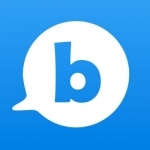
busuu - Learn Languages
Education and Travel
App
Join 70 million busuu users waiting to help you learn a language! Become a member of the busuu...
Mayhawke (97 KP) rated I am No One in Books
Feb 13, 2018
O'Keefe is a difficult character to really sympathise with. Whilst his ideology is admirably egalitarian he falls into that bracket of slightly stuffy, middle-class liberals who take themselves too seriously and fail to practise what they preach. In fairness to O'Keefe he largely has the grace and self-awareness to question the rationality of his fears and accidental moments of prejudice (though he is of the very typical male Liberal variety that doesn't seem to recognise the contradiction of professing himself feminist whilst watching porn): slightly pompous, slightly too much self-regard slightly too much sense of victimhood, he is not unlikeable just a bit of a non-entity. Whilst this is clearly intentional it makes his narrative stodgy. Not unreadable, but at the same time easy to put down for a week whilst a more engaging book is read. This is either a spectacularly adept piece of characterisation or an unfortunate reflection of the author, Patrick Flanery. I do hope it is the writing because if not then all the peculiar, inaccurate and unlikely observations made by O'Keefe onbehalf of his character regarding differences between the British and Americans are likely also Flanery's:. For example the breath-taking assertion that socio-economic failure is treated more harshly in the UK than in the US, when any basic knowledge of sociology in the two countries shows that the criteria for failure is a) much broader in the US and b) responded to far more harshly, e.g.: "if you don't earn enough from your three jobs to afford medical insurance to pay for your cancer treatment, you clearly haven't worked hard enough. The fault is yours , you are a failure and the punishment is premature death.". It is also difficult to accept that Flanery is regularly treated with distrust and dislike by bank cashiers for his Irish name. Quite aside from anything else most bank cashiers in this country now aren't old enough to remember the Irish troubles, and the bigots-for-bigotry's-sake have long since transferred their angst from the Irish to the Poles and the Muslims.
Flanery is also an academic, something that is abundantly obvious from the highly structured writing method he employs in this book. The reader is left with the impression that where other novelists write books to be read as stories Flanery has written a text with an eye to future deconstruction by English Lit students. That is not necessarily a bad thing, of course, but occasionally one wishes he could have been a little less concerned with construction in the minutiae and more concerned with crafting a story with a complete beginning, middle and end. And therein lies one of the greatest failings of this book: it has no real conclusion. Questions are raised that go unanswered. In particular, there are issues with characters, whose true identity may never be elaborated upon or, in the case of his girlfriend who makes a sudden, poorly explained behavioural volte-face that is entirely out of character but provides Flanery with a device to enable his protagonist take the critical closing step to the tale.
It seems that Flanery has written this book as a parable on the dangers of unfettered digital surveillance: how easy it is for those who wish to to access all our personal data and how very quickly and efficiently lives can be subverted. Whilst this may be a revelation to a few it has to be said that there is nothing revealed in this book about the scope and methods of data collection that anyone who has even a small amount of technical savvy won't already know, which rather undermines it as an expose. The book also attempts to portray how easy it is to suddenly and unintentionally find oneself on the wrong side of the law. Unfortunately in this story the actions which purport to have landed O'Keefe in possible criminality are so ridiculous and far-fetched that only the most paranoid would ever see an offence in them. Contrary to highlighting the ease with which the well intentioned can unwittingly find themselves in need of lawyers it suggests that all the peripheral characters are actually far more paranoid and delusional than O'Keefe will ever be.
All that aside this was an intriguing and mildly engaging story. Largely well-written but let down by a an unsatisfactory conclusion and a failure to induce the kind of fear that was intended.
RəX Regent (349 KP) rated The Wicker Man (1973) in Movies
Feb 18, 2019
But if you are expecting some dimly lit, slow burn slasher movie, then you will be sorely disappointed. The Wicker Man spends most of its runtime, which varies from its various versions, Theatrical, Director’s and Final Cuts, providing us with a pretty decent, if not disturbing insight into paganism.
Or more over, Paganism verses Christianity. Both spiritual, both magical, yet one is fun and the other is boring. The virgin sacrifice by the sexually liberated heathens is played out brilliantly.
The beauty here is that the final twist is so well conceived and executed throughout the entire film that even though most of us know the ending whether we have seen the film or not, it is not spoiled by that foreknowledge.
It is a kin to the previously released Planet Of The Apes (1968) or the much later Sixth Sense (1999). Both spin out complex genre tales which culminate in “that ending”. But in this case, Edward Woodward delivers a chilling performance in the finale, as he is taken to his death, locked inside the burning Wicker Man to be sacrificed in order to restore the poor harvest of the previous year.
“Don’t you see that killing me is not going to bring back your apples?”
But Woodward’s character is a devout Christian and he has only his faith and a dogged view of the world to aide him. Unable to accept the seemingly free spirited community in which his finds himself, one where sex is commonplace as he himself is still a virgin.
On the other hand there is Lord Summerisle, Christopher Lee, who steals the show as per usual as the charismatic leader of the this pagan community and the descendant of a lord who routed Christianity from the Highland Island a century before.
But whilst on the surface it may seem like a rather academic subject, the film is a trippy 1970’s sexploitation movie in many ways. Some of the sex and violence fits in well with plot but other moments, such as the nude dance by Britt Ekland, though actually doubled by Lorraine Peters is a prime example of a needless, if not memorable sequence.
Overall, The Wicker Man is low budget British movie of the 1970’s and one which has endured to earn it’s classic status, by meeting the main criteria of being smart, engaging and visually compelling, along with several standout performances throughout.
